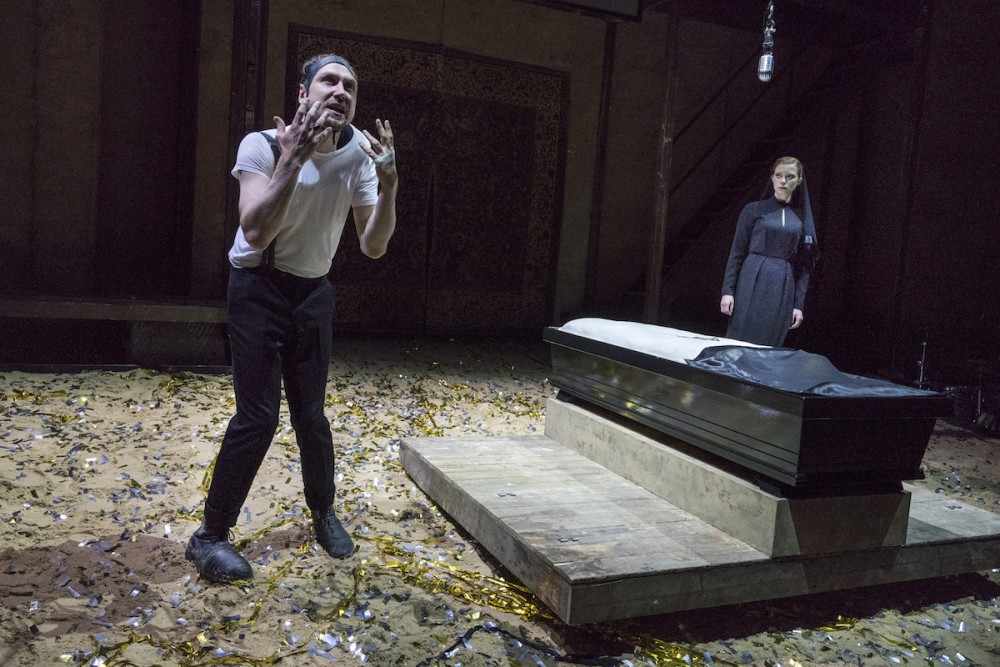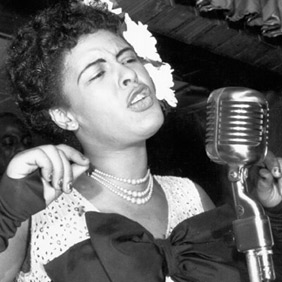by: JK Clarke
It’s probably safe to say that never has an audience been so bewildered by a play before, during and after it takes place as at a recent performance of Ubu, now playing at INTAR. Even after the cast had bowed and the house lights went up, much of the audience was uncertain whether the play was actually over . . . or, for that matter, what exactly they had just witnessed. Presumably, that occurs with each performance.
Ubu is based on the late 19th century Alfred Jarry play, Ubu Roi, which pre-dated, and led to, surrealist and absurdist theater movements. While the exact origin of the character “Ubu Père” is unknown, it likely draws on the oversized and monstrous Rabelaisian characters Gargantua and Pantagruel. The lineage of these characters is significant since, throughout French literary history, they embodied a means of conveying social protest through outsized, deformed characters, often described as human marionettes. While this production is updated for a contemporary audience (it would be absurd in all the wrong ways to mock 19th century socio-political problems now), everything about this Ubu is grotesque in the most literal sense: the gluttony, the sex, the boastfulness, and the absurdity itself. It’s meant to be.
Ubu (a truly amazing and dynamic Daniel Irizarry, who also directs) tells us, though we certainly already know, that he is the most powerful man in the universe; and we, the employees (at first) of one of the companies he owns, have been invited to watch him eat steak (very rare steak on which he continually gags and spits all over the floor), because he likes his employees to have a chance to look at him and to see his house: “Think of it as a privilege. Consider yourself lucky. It is an honor. Congratulations. Your life has meaning right now.”
Ubu is the ultimate megalomaniac, not to be confused with the ultimate narcissist, because he could care less if we loved him and prefers to be powerful rather than charming. He is oversized, frenetic and clownish, revoltingly exhibiting a long, serpentine tongue that should be paired, like socks, with that of Miley Cyrus. When Ubu wants something, be it sexual favors or libation, he screams for it wildly and interminably: “Wine! Wine! Wine! Wine! Wine! Wine! Wine!” And wine he gets, from sycophantic, sub-human minions who are so insignificant to him that they speak a non-language, a gobbledy-gook of sounds whose patterns approximate language, but have no meaning whatsoever.
Ubu the play is a surrealistic ejaculation of noise and ideas and motion which constantly breaks convention. Just when you think the fourth wall has already been broken by Ubu addressing the audience as his employees, he steps through it again, perhaps improvisationally (“look, no more fourth wall”) saying, “Are you not a lover of the arts? You are a terrible audience,” then reverts back, telling his employees (us), in an echo of another famous megalomaniac, “You’re fired! You’re fired! You’re fired! You’re fired! . . . ”
But this acid trip of a production starts before the play itself starts and ends after it “ends.” We are seated by Ubu’s servants (Laura Butler Rivera, Michael Mullen, Anita Perry) who greet us with utter excitement, then silently play mischief with the theater’s barman (John Gentile) and audience members. And the stage manager (Zina Rose Goodall), frequently laughs or shouts out loud from the sound booth, then inexplicably, joins the production . . . as an audience member? As a cast member? It’s impossible to say, but she’s not in costume. It feels improvised, but it likely is not. Which is the general mood of the entire play. Nothing whatsoever is certain.
Aside from the wonderful rolicking, clownish and often acrobatic performances of Ubu’s servants, special notice must be made of Marcelo Anez’s extraordinary sound design, which not only incorporates humorous and astounding sounds, but has the very jarring effect of making the small theater feel as if it’s full of revelers and participants, so much so that one is surprised to see there are so relatively few people in attendance. Additionally, he threads in the history of the play with strains of elegant classical pieces like Vivaldi’s Concerto in C Major for Mandolin that shouldn’t fit with the madness, but somehow does so perfectly.
One would be tempted to call Ubu “punk rock,” except that there’s nothing “rock” about it. It is punk, though — punk classical theater, perhaps. And Irizarry as Ubu is our Henry Rollins: smart, outrageous and with something to say. This type of theater is not for everyone. If you like daring, vigorous and unconventional theater, do not miss this play. But if you prefer linear, conventional theater, have tender sensibilities and are easily offended (there are some remarkably vulgar moments), you might want to pass.
Ubu. Directed by Daniel Irizarry. Through October 6 at INTAR Theater (500 West 52nd Street at 10th Avenue). www.intartheatre.org/on-stage-now






















